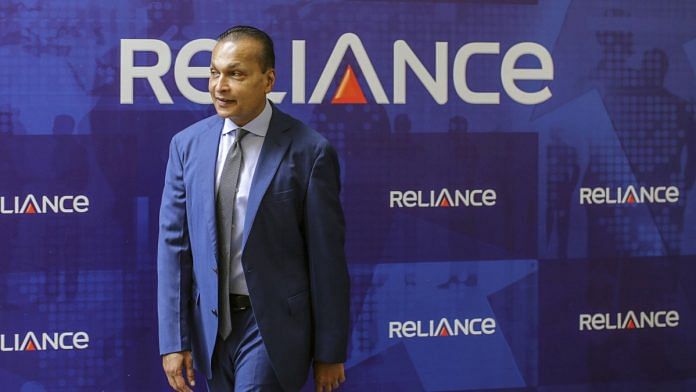New Delhi: The Supreme Court Thursday upheld a 2017 arbitral award of Rs 4,660 crore including interest in favour of the Anil Ambani-led Reliance Infrastructure Ltd, putting an end to its protracted legal battle with the Delhi Metro Rail Corporation (DMRC).
The judgment was passed by a bench comprising Justice L. Nageswara Rao and Justice S. Ravindra Bhat on appeals challenging a verdict passed on 15 January 2019 by the Delhi High Court, which had partly set aside the arbitral award.
The apex court judgment came after a nine-year-long legal battle that was initiated by the DMRC itself, which invoked the arbitration clause against the Delhi Airport Metro Express Private Ltd (DAMEPL) in 2012. The DAMEPL is a company incorporated as a special purpose vehicle by the consortium of M/s Reliance Infrastructure Limited and M/s Construcciones Y Auxiliar de Ferrocarriles SA, Spain. The DMRC is a state-owned company that is a joint venture between the central and the Delhi governments.
The arbitral tribunal had ruled in favour of DAMEPL, awarding it a total amount of Rs 2,782.33 crore, with interest. According to reports, this raised the award to over Rs 4,660 crore ($632 million).
The verdict is being touted as a crucial win for Ambani, whose telecom firms are in bankruptcy. ThePrint explains what this case is all about.
Also read: Anil Ambani, CBI ex-chief Alok Verma & top cop Rakesh Asthana on latest Pegasus ‘snoop’ list
First PPP in metro construction and operations
The DMRC entered into an agreement with DAMEPL, promoted by Reliance Infrastructure, in 2008 for design, installation, commissioning, operation and maintenance of the Airport Metro Express Line project in New Delhi.
The project was hailed as the first public-private partnership (PPP) in metro construction and operations. According to the agreement, DMRC was responsible for all civil work, appointment of consultants and obtaining clearances, while DAMEPL was responsible for design, supply, installation, testing and commissioning of various systems such as power supply, overhead equipment, signalling, track system, platform, screen doors, ventilation and architectural finishing.
The project received safety clearances from the commissioner of metro railway safety in January 2011 and commercial operation of the metro line began on 23 February 2011.
The DAMEPL was to operate and maintain the metro line till August 2038. However, about 18 months after the metro line became operational, DAMEPL stopped operation of the line on 8 July 2012, citing defects in DMRC’s works.
DAEMEPL then issued a notice to DMRC on 9 July 2012, giving it 90 days to cure the defects listed by it. It terminated the agreement on 8 October 2012, alleging that the defects were not cured within the 90-day period.
DMRC invokes arbitration clause
The DMRC invoked the arbitration clause under the agreement on 23 October 2012.
Meanwhile, the metro line was restarted on 22 January 2013 with reduced speed after obtaining a certification sanctioning resumption from the commissioner of metro railway safety. The metro line was still being operated by the DAMEPL, with DAMEPL asserting that was doing so as an agent, in public interest.
However, DAMEPL stopped its operations on 30 June 2013 and handed over the line to DMRC the next day.
The DMRC claimed to the arbitral tribunal that the termination notice issued by DAMEPL was illegal as DMRC had taken various steps honouring its obligations under the agreement. It demanded that DAMEPL either take over operations of the metro line or pay compensation of Rs 3,173 crore with an interest of 18 per cent per annum.
In response, DAMEPL filed a counter claim of Rs 3,470 crore as termination payment along with interest, on the ground that DMRC did not cure the defects in the civil structure, despite its notice.
Also read: Russian bidder backs out, Turkey firm keen on buying debt-laden Anil Ambani shipyard
1,551 cracks in 367 girders
In its verdict, the arbitral tribunal undertook an in-depth analysis of the defects in the civil structure and the steps taken for their repair. It noted that there were as many as 1,551 cracks in 367 girders, that is, 72 per cent of the girders were affected by such cracks.
According to the Supreme Court judgment, the tribunal had then concluded that because of there being such a large number of cracks in concrete girders in about a year of train operations, along with “non-serious inspection of the repairs by an agency appointed by DMRC”, the defects adversely affected the integrity of the structure. It therefore found DMRC to be in breach of the agreement and concluded that the termination notice by DAMEPL was valid.
The tribunal awarded a total amount of Rs 2,782.33 crore, along with interest as termination payment to DAMEPL. The DMRC challenged the tribunal’s award in the Delhi High Court.
While a single judge-bench of the high court rejected DMRC’s petition in March 2018, a division bench of the high court partly set aside the arbitral award in January 2019. This was then challenged in the Supreme Court by both the parties.
‘Shocked the conscience of the court’
The Delhi High Court ruled that the tribunal award “shocked the conscience of the court”. However, the Supreme Court has now opined that this conclusion of the high court’s division bench was “erroneous”.
The Supreme Court asserted that the certificate issued by the commissioner of metro railway safety to restart operations cannot by itself show that DMRC had cured the defects pointed out by DAMEPL.
“The members of the Arbitral Tribunal, nominated in accordance with the agreed procedure between the parties, are engineers and their award is not meant to be scrutinised in the same manner as one prepared by legally trained minds. In any event, it cannot be said that the view of the Tribunal is perverse,” the apex court concluded, setting aside the division bench verdict.
(Edited by Manasa Mohan)
Also read: 10 facts you probably didn’t know about the Delhi Metro that just turned 17



